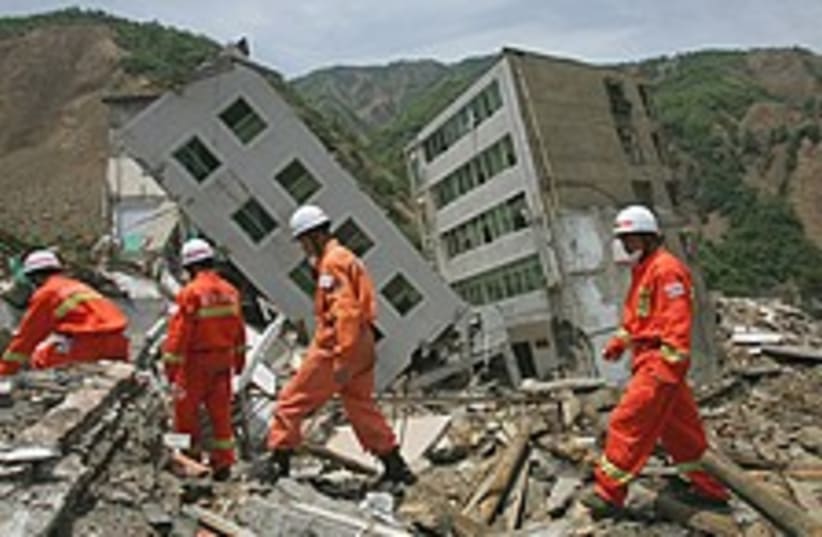God and the earthquake
My understanding of the Creator is far removed from the reality of His existence.
It has become very difficult to go to synagogue lately. Praying to God has become a real challenge. Watching China's great misfortune on the news, seeing children buried under rubble and collapsed school buildings, and knowing that there are thousands and thousands more of them makes it hard to speak to the Creator in a gentle tone of praise and thanksgiving. By now, we know that over 80,000 have died and millions have lost their homes and all that was dear to them. An incredible disaster has happened, and it was not wrought by man, but by Heaven.
What religious person does not feel traumatized at such a moment? Who does not experience a moment of rebellion against the Lord of the Universe? Who does not ask whether it is possible to stay religious after such immense pain?
Shall we, then, ban Him from our lives, declaring Him dead and irrelevant? Consider Him a mistake in the thoughts of our forefathers? Would it help? Make more sense? Would it solve any problem? I have read many books, from Epicurus to Richard Dawkins, suggesting that I become a non-believer. Not impressive, too superficial; not enough soul and too much self- interest.
Once again, though, what the earthquake in China teaches me is that my understanding of God is far removed from the reality of His existence. I am forced once more to radically change my thoughts about God and admit my ignorance when thinking about Him. Trying to understand God is like explaining a three-dimensional reality with the help of a flat surface. I realize that there is a huge expanse beyond the shore of my reason. I am aware that there is a metaphysical murmur trying to penetrate my thinking, but it is unable to get through and stops halfway before it crashes my skull.
I LIVE in infinite tension; I am a citizen of two worlds which make up my life. I see and sense God everywhere, but realize that I am blind because I cannot stop converting His realities into my opinions, my belief in Him into dogmas, and His sublimity into clichés.
In these two worlds, the overwhelming sense of God's existence and the constant pressure asking me to deny Him become the foundations of my life. And in that land of many contrasts and paradoxes, I need to face Him and serve Him, being pulled in opposite directions of love and bitterness toward Him. My humble prayer, the sense of awe when I observe His magnificent world, and my need to thank Him for every breath of air He grants me mixes with my need to storm the heavens and shout a protest against Him as I carry the tears of millions of Chinese fellow-men, and so many others, and place them in front of His throne. This is my lot... as a Jew.
God is more than existing. Existing is only His minimum capacity.
He is more than existing, more than infinite, and more than timeless. He is not less than real, but more than real. When speaking about Him, I must become aware that I use words borrowed from the general sphere of human experience, words which do not fit into the world of faith. Faith, itself, is mostly starved of language. And so are my thoughts. They depend on language, and once I yearn for something beyond this, I am wordless and realize that my words and thoughts can only carry me until the moment I confront Him, after which they evaporate in meaninglessness since they need to convey that which is more than meaningfulness.
IF HE would only exist, I would not believe in Him. So, I will continue to speak to Him, argue with Him, observe His commandments, knowing that when I am confronted with calamity I am confronted with the knowledge that my wisdom is inferior to dust. I become aware that I cannot even endure the heartbreaking splendor of sunset, much less my meeting with Him in the pain of this world. So I will continue to pray for the Chinese, and for all people in pain and helplessness.
The writer is an author of many books on Judaism and is dean of the David Cardozo Academy in Jerusalem.
if(catID != 151){
var cont = `Take Israel home with the new
Jerusalem Post Store
Shop now >>
`;
document.getElementById("linkPremium").innerHTML = cont;
var divWithLink = document.getElementById("premium-link");
if(divWithLink !== null && divWithLink !== 'undefined')
{
divWithLink.style.border = "solid 1px #cb0f3e";
divWithLink.style.textAlign = "center";
divWithLink.style.marginBottom = "40px";
divWithLink.style.marginTop = "40px";
divWithLink.style.width = "728px";
divWithLink.style.backgroundColor = "#3c4860";
divWithLink.style.color = "#ffffff";
}
}
(function (v, i){
});

